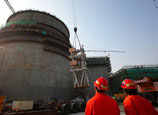
"China's growth of money supply dropped last year to a low of 13.8 percent from the average annual growth of 18 percent during 2001-10," Li said.
"Central banks of major economies have continuously rolled out monetary easing policies in recent months, increasing global liquidity and cross-border capital flows. But China's central bank has restrained itself from releasing too much liquidity into the economy," said Song from UIBE.
Following monetary data announcements by the US and the EU, Japan's central bank said on January 22 it would pump more money into the economy.
"Countries like China that rely on indirect financing means such as bank loans will have a larger money supply compared to those that rely on direct financing such as corporate bonds and equity financing," said E Yongjian, a researcher with the Bank of Communications in Shanghai.
"But the ratio of bank loans in total financing has already dropped. As financing channels expand, China will see a slower growth of money supply," E said.
The ratio of yuan loans to total social financing - a broad measure of liquidity - was 52.1 percent in 2012, 6.1 percentage points down from 2011, while the ratio of corporate bonds to total social financing rose to 14.3 percent, up 3.7 percentage points from the previous year.
 |
















 Buildings collapse after subsidence in S China
Buildings collapse after subsidence in S China


![]()
